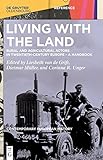Living with the Land : Rural and Agricultural Actors in Twentieth-Century Europe – A Handbook / ed. by Liesbeth van de Grift, Dietmar Müller, Corinna R. Unger.
Material type: TextSeries: Contemporary European History ; 3Publisher: München ; Wien : De Gruyter Oldenbourg, [2022]Copyright date: ©2022Description: 1 online resource (VIII, 363 p.)Content type:
TextSeries: Contemporary European History ; 3Publisher: München ; Wien : De Gruyter Oldenbourg, [2022]Copyright date: ©2022Description: 1 online resource (VIII, 363 p.)Content type: - 9783110678567
- 9783110678659
- 9783110678628
- online - DeGruyter
- Issued also in print.
| Item type | Current library | Call number | URL | Status | Notes | Barcode | |
|---|---|---|---|---|---|---|---|
 eBook
eBook
|
Biblioteca "Angelicum" Pont. Univ. S.Tommaso d'Aquino Nuvola online | online - DeGruyter (Browse shelf(Opens below)) | Online access | Not for loan (Accesso limitato) | Accesso per gli utenti autorizzati / Access for authorized users | (dgr)9783110678628 |
Frontmatter -- Table of Contents -- On the “Contemporary European History” Handbook Series -- 1 Living with the Land: Introduction -- I Working the Land -- 2 Opening Up the Land: Infrastructures in Rural Europe -- 3 Reclaiming the Land: The Drainage Paradigm and the Making of Twentieth-Century Rural Europe -- 4 Developing Rural Regions: Europe in the World -- II Managing Land and Labor -- 5 Mediating Modernity: The Social History of Rural Domestic Education in Northwestern Europe -- 6 Pooling Resources in the European Countryside: Cooperative Models, Rural Capitalism, and Beyond -- 7 Farming under Occupation: Rural Actors and the Social Dynamics of Occupation during World War II -- 8 Transforming Agriculture and Rurality: The Common Agricultural Policy, Actors, National Adaptation and Responses to Policy Challenges -- III Knowing the Land -- 9 Registering Land and Forests: European Institutions and Practices of Landownership -- 10 Experimenting with Scientific Management: New Approaches to Agricultural Labor in the Twentieth Century -- 11 Developing Agriculture, Modernizing Rural Society: Transnational Dimensions of Agricultural Expertise -- IV Organizing Life on the Land -- 12 Representing Peasants and Farmers: Parties, Movements, and Leaders Across Europe -- 13 Governing the Village: Rural Mayors and the Transformations of Self-Government in Europe -- 14 Managing Culture in the European Countryside: The Modern Roots of Rural Traditions -- 15 Challenging Socialist Village Structures: Youth in Rural Regions since 1945 -- List of Contributors -- Index
restricted access online access with authorization star
http://purl.org/coar/access_right/c_16ec
For a long time agriculture and rural life were dismissed by many contemporaries as irrelevant or old-fashioned. Contrasted with cities as centers of intellectual debate and political decision-making, the countryside seemed to be becoming increasingly irrelevant. Today, politicians in many European countries are starting to understand that the neglect of the countryside has created grave problems. Similarly, historians are remembering that European history in the twentieth century was strongly influenced by problems connected to the production of food, access to natural resources, land rights, and the political representation and activism of rural populations. Hence, the handbook offers an overview of historical knowledge on a variety of topics related to the land. It does so through a distinctly activity-centric and genuinely European perspective. Rather than comparing different national approaches to living with the land, the different chapters focus on particular activities – from measuring to settling the land, from producing and selling food to improving agronomic knowledge, from organizing rural life to challenging political structures in the countryside. Furthermore, the handbook overcomes the traditional division between East and West, North and South, by embracing a transregional approach that allows readers to gain an understanding of similarities and differences across national and ideological borders in twentieth-century Europe.
Issued also in print.
Mode of access: Internet via World Wide Web.
In English.
Description based on online resource; title from PDF title page (publisher's Web site, viewed 02. Mai 2023)


